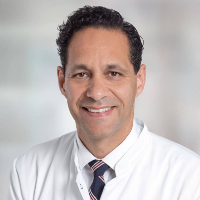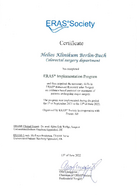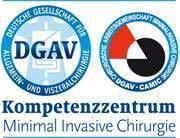Surgical Transanal Excision for Rectal Cancer treatment in the Best Hospitals in the World
Treatment prices are regulated by national law of the corresponding countries, but can also include additional hospital coefficients. In order to receive the individual cost calculation, please send us the request and medical records.

Department of General, Abdominal Surgery and Surgical Oncology
The Department of General, Abdominal Surgery and Surgical Oncology offers the full range of services in these medical fields. Whenever possible, operations are performed using minimally invasive techniques, which are the gold standard of modern surgery. The outstanding quality of medical care is confirmed by numerous prestigious certificates, including certificates from the German Cancer Society, the German Hernia Society, etc. In addition, the department provides innovative hyperthermic intraperitoneal chemotherapy (HIPEC), which is available only in the most progressive clinics in Europe.







Department of General and Abdominal Surgery, Colorectal Surgery, Hepatopancreatobiliary Surgery, Hernia Surgery and Bariatric Surgery
The Department of General and Abdominal Surgery, Colorectal Surgery, Hepatopancreatobiliary Surgery, Hernia Surgery and Bariatric Surgery provides the full range of surgical treatment in its field of competence. The department's highly qualified surgeons annually perform about 2,000 surgical interventions. Extensive clinical experience allows the specialists to perform even particularly complex operations. The department’s advanced operating rooms serve for surgery to treat gastrointestinal diseases, liver, gallbladder, bile duct, pancreatic, rectal, anal and colon pathologies. The medical facility also successfully performs operations to treat hernias: inguinal, umbilical, and anterior abdominal wall hernias. In addition, the department's doctors deal with the surgical treatment of morbid obesity. Minor traumatic laparoscopic interventions are considered the gold standard, which guarantee a patient minimal risks and rapid postoperative restoration. Surgeons tell the patient in detail about their upcoming treatment and, in every possible way, support them in their recovery.







Department of General and Abdominal Surgery, Colorectal Surgery, Endocrine Surgery and Hernia Surgery
The Department of General and Abdominal Surgery, Colorectal Surgery, Endocrine Surgery and Hernia Surgery offers the full range of modern surgical interventions in the areas of its specialization. Every year, the medical facility performs more than 2,500 surgical interventions on an inpatient and outpatient basis. The department has vast clinical experience in the field of minimally invasive surgery, which allows the patient to avoid severe pain and prolonged hospitalization. In addition, the department offers robotic surgery using the most modern models of the da Vinci surgical system. The medical facility has the status of the Reference Center for Minimally Invasive Surgery and Hernia Surgery. Surgical treatment of cancer is one of the department's clinical priority focuses. A large number of da Vinci robot-assisted interventions are performed here for gastrointestinal cancers. The department holds a leading position in the use of the da Vinci surgical system in the treatment of rectal and sigmoid cancer patients. The operating rooms of the medical facility are equipped with the very latest technology, while hygiene and safety standards are at the highest level as well. Prior to surgery, the patient undergoes a comprehensive examination. Doctors also assess the risks of the upcoming operation and its expected results. With appropriate clinical indications, preference is always given to minimally invasive surgery.






Colorectal cancer occupies one of the leading places among all malignant tumors incidence. Currently, there is a steady increase in both morbidity and mortality from colorectal cancer. Colorectal cancer represents malignant formations of the large intestine (cecum, colon, and rectum), different in shape, localization, and histological structure.
Overview
Colorectal cancer usually develops slowly. It is believed that it takes at least 10-15 years from the onset of precancerous changes to the formation of a tumor. In patients with other diseases, such as Lynch syndrome or hereditary non-polyposis, colorectal cancer develops rapidly. With these syndromes, colorectal cancer can develop faster than in normal cases – for example, within one to two years on the visually healthy intestinal mucosa.
As colorectal cancer develops slowly and gradually, the risk of cancer increases with age. The risk of morbidity begins to increase sharply with age – 90% of all colorectal cancer patients are over the age of 50. Colorectal cancer is diagnosed very often in patients over 70 as well.
Colorectal cancer has a gradual process of development that depends on various factors. This means that colorectal cancer requires a combination of several factors that influences patients.
The gradual process of colorectal cancer formation implies the development of changes throughout a significant time period. At the first stages, a benign tumor in the intestine occurs. Over time, the transformation of a benign formation (polyp) into a malignant one occurs. Not all polyps develop into colorectal cancer, though. The reverse development of polyps is also possible, but approximately every 12th polyp transforms into cancerous one.
Why does colorectal cancer occur?
In addition to age, dietary habits, history of benign rectal tumors (polyps), the incidence of colorectal cancer in close relatives (for example, one case of colorectal cancer or an advanced case of adenoma in close relatives) doubles the risk.
Nevertheless, 75% of patients with colorectal cancer do not have a hereditary predisposition, that is, their relatives have no cases of colorectal cancer. About 25% of colorectal cancer cases are presumably hereditary, but the exact number of genetic disorders, their location, nature, and mechanism is not known. The incidence of rectal cancer in patients with hereditary predisposition is still less common.
Both smoking and excessive consumption of red meat increase the oncological risk. People who move a lot and eat a moderate calorie diet definitely have a lower risk of colorectal cancer.
Among other factors, the risk is also increased by previous surgery of any kind. Patients who have previously been operated specifically on polyps or colorectal cancer have a higher risk of recurrent rectal cancer.
Diagnostics
Rectal cancer cannot be diagnosed without colonoscopy and biopsy. Treatment should not be started until patients undergo the histological examination of a tissue sample taken during a biopsy.
In addition to colonoscopy, the list of mandatory examinations include:
- MRI. In addition to assessing the local spread of colorectal cancer, MRI is indispensable for the planning of clinical treatment. The use of MRI data in planning possible surgery can significantly reduce the number of clinical side effects for patients.
- Ultrasound of the abdominal cavity organs.
- Chest X-ray. A chest X-ray is performed to exclude the presence of metastases.
- CT of the chest and abdomen. CT of the chest and abdomen with mandatory intravenous contrast enhancement is possible instead of the ultrasound examination.
- SCC marker (Squamous Cell Carcinoma Antigen marker). SCC marker can be helpful in terms of deciding on the treatment, especially in patients with initially advanced rectal cancer.
To exclude concomitant diseases, ECG, gastroscopy, complete blood count and clinical tests are also performed.
Treatment
Traditional methods of surgical treatment of patients with benign rectal tumors are represented by endoscopic electroexcision and local transanal excision. Surgical tactics in relation to early stages of rectal cancer depends on tumor origin, localization, histological structure, degree of invasion into the intestinal wall, and the prognosis of colorectal cancer progression. The age and clinical condition of patients are also taken into account.
A thorough preliminary examination of patients with colorectal cancer allows doctors to choose the optimal method of surgical cancer treatment.
The method of transanal excision surgery of rectal tumors is one of the latest achievements in modern surgery. The specific features of the method are low invasiveness, rarely occurring complications, good treatment results. The patients with early stage rectal cancer are eligible for the transanal excision surgery. The practice guidelines in oncology prove the effectiveness of transanal excision surgery for rectal cancer treatment.
Transanal excision surgery for rectal cancer is a modern highly effective method of treatment. It can also be used for surgical salvage of recurrent rectal cancer.
A relatively new technique of transanal excision surgery is used as an alternative to the conventional minimally invasive methods of surgical treatment of colorectal cancer.
The advantages of the transanal excision surgery include its low invasiveness, no need for anesthesia, and favorable outcomes of interventions. However, in the case of large (more than 3cm in diameter) malignant rectal tumors, long-term results of resection are assessed as unsatisfactory and preference is given to open interventions.
The use of high-precision instruments guarantees a highly effective surgery that allows a doctor to completely remove the tumor within any layer of the rectal wall and adjacent mesorectal tissue while maintaining the function of the rectum after the intervention.
Transanal excision surgery allows better visualization of anatomical structures, and in combination with laparoscopic assistance it fully meets the requirements of minimally invasive surgery with all its advantages.
Nevertheless, some surgeons insist on using a more radical type of resection – total mesorectal excision. Mesorectal excision surgery follows a medical protocol similar to transanal excision surgery but it is often used in patients with advanced rectal cancer.
While transanal excision surgery is prescribed for patients with rectal cancer in the middle part of the rectum, mesorectal excision surgery is prescribed for patients with the location of the tumor in the lower two-third of the rectum. This type of resection is associated with a more complicated postoperative period, and it can be performed only by doctors with extensive clinical experience in rectal surgery.
The advantage of the transanal excision technique for the treatment of rectal neoplasms is the possibility to completely remove the tumor, but its use is limited to the tumors in the lower and, partly, in the middle parts of the rectum. This is due to a limited view of the operating field during the intervention, which often leads to unsuccessful resection. One of the factors that influence the effectiveness of the transanal excision surgery is the volume, and structure of the rectal neoplasm.
According to clinical research, the recurrence rate of rectal cancer after the transanal excision surgery is 5.5%, which is significantly lower in comparison to conventional surgical techniques. Many patients demonstrate satisfactory results in 3 months after the resection.
Thus, it becomes obvious that transanal excision surgery, with a careful selection of the eligible patients, is prior to the traditional methods of rectal cancer treatment in terms of efficiency.
Often, due to the remoteness of the formation from the anal edge, technical difficulties arise due to poor visualization of the operating field and the medical inability to accurately determine the boundaries and depth of tumor growth, and, consequently, the boundaries of resection.
Transanal excision surgery is still preferable for the following reasons:
- Good visualization in patients with a narrow pelvis
- More precise isolation of the pelvic nerves, which allows preserving the function of the pelvic nerves
- There is a possibility of its application with combined modality therapy, that includes rectal cancer treatment with radiation therapy and chemotherapy
Thus, transanal excision methods are constantly being improved, gaining new areas of medical implementation in rectal surgery.
Benefits of transanal excision
The technique of transanal excision surgery is a highly effective way of treatment of benign and malignant neoplasms of the rectum. It may as well be the method of choice for some patients with early stage rectal cancer.
Transanal excision surgery has several advantages over the conventional clinical treatments of rectal cancer that include:
- Possibility to access all parts of the rectum
- Surgery can be carried out within tissues of most sections and layers of the rectal wall
- Transanal excision surgery allows carrying out radical surgical interventions
- Transanal excision surgery is a sparing method of surgery for rectal cancer patients, that allows operating on elderly patients with severe clinical pathology
- Minimal risk of complications
- Absence of functional disorders of the colon and rectum in the postoperative period
- The possibility of early rehabilitation of patients in a short period of time
- Low cost of surgery for patients that associated with the shortening of the postoperative stay and the use of less expensive components for surgery
Where can I undergo transanal excision for rectal cancer treatment abroad?
The best success rates in the transanal excision surgery are demonstrated by:
- Academic Hospital Brothers of Charity Munich, Germany
- University Hospital of Ludwig Maximilian University Munich, Germany
- Charite University Hospital, Germany
- University Hospital Ulm, Germany
- Tel Aviv Sourasky Medical Center, Israel
- Medipol Mega University Hospital Istanbul, Turkey
You can check out the full list of hospitals on the Booking Health website.
The cost of rectal cancer treatment with transanal excision
The prices in hospitals listed on the Booking Health website are relatively low. With Booking Health, you can undergo rectal cancer treatment in the best hospitals in the world at an affordable price.
The cost varies, as the price for treatment depends on the hospital, the diagnosis, and the complexity of treatment:
- The price for treatment in Germany is from 24,897 EUR to 39,308 EUR
- The price for treatment in Israel is approximately 22,100 EUR
- The price for treatment in Turkey is approximately 12,600 EUR
The final cost may differ from the prices mentioned above. To make sure that the price for treatment is suitable for you, contact us by leaving the request on Booking Health website.
How can I undergo transanal excision in the best hospitals in the world?
It is not easy to choose the right hospital that ensures successful transanal excision surgery. It is vital to have accurate information on the success rates in rectal cancer treatment of the specific hospital.
We have up-to-date information on rectal cancer treatment in the best hospitals in the world.
Booking Health will select a hospital, taking into account your wishes and the prescriptions for rectal cancer treatment.
We may help you during this difficult period and take on all the issues. You can be free of unnecessary stress, while Booking Health takes care of all organizational issues. Our goal is to find the best facility for rectal cancer treatment for you.
Rectal cancer can be treated! The earlier you start the treatment, the higher the chances of returning to your day-to-day life. All you need to do is to leave the request on the Booking Health website and our manager will contact you shortly.

